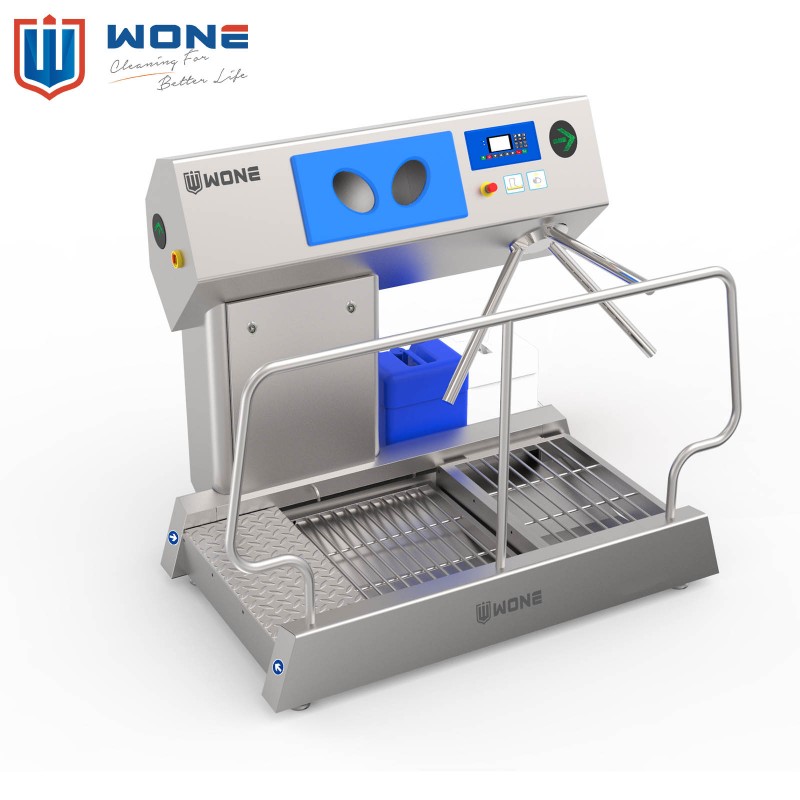How to Prevent Pollution of Shoe Disinfection Pool
Shoe disinfection pools, also known as boot wash machines or shoe cleaning stations, have become an essential tool in various food industries to maintain hygiene and prevent the spread of diseases. However, it is crucial to ensure that these disinfection pools are properly maintained to prevent pollution and ensure their effectiveness. In this article, we will discuss some essential tips on how to prevent pollution of shoe disinfection pools.
(1).png)
Regular Cleaning and Maintenance
Regular cleaning and maintenance are the key to preventing pollution in shoe disinfection pools. These machines should be cleaned and sanitized daily to remove any dirt, debris, or contaminants that may accumulate. The cleaning process should include thorough scrubbing of the surfaces, both inside and outside the machine, with a disinfectant solution. Additionally, the brushes and nozzles should be inspected and cleaned or replaced if damaged.
WONE hygiene station and Boots Cleaning Machine has self-cleaning function and it reduces the burden of cleaning.
Use of Effective Disinfectants
Choosing the right disinfectant is essential to prevent pollution of shoe disinfection pools. Not all disinfectants are effective against all types of microorganisms. It is crucial to select a disinfectant that is specifically formulated to kill the pathogens of concern. Additionally, the disinfectant should be approved by relevant authorities and used according to the manufacturer's instructions. It is essential to regularly monitor the disinfectant concentration to ensure its effectiveness.
Strict Monitoring of Water Levels
Maintaining the correct water levels in shoe disinfection pools is crucial to prevent pollution. If the water levels are too low, it can lead to improper cleaning and disinfection of shoes. On the other hand, if the water levels are too high, it can cause the disinfectant to overflow, leading to wastage and contamination. Regular monitoring of water levels and refilling or draining as necessary is necessary to ensure proper functioning and prevent pollution.
Employee Education and Training
Proper training and education of employees who are responsible for operating and maintaining shoe disinfection pools are essential to prevent pollution. They should be educated about the correct usage, cleaning, and maintenance procedures. Additionally, they should be trained on how to identify signs of pollution or malfunctioning of the machine. Regular refresher courses and updates should be provided to keep them informed about the latest best practices.
Regular Inspection and Quality Control
Regular inspection and quality control measures should be in place to prevent pollution of shoe disinfection pools. This can include daily visual inspections to ensure proper functioning, checking for leaks, ensuring the brushes and nozzles are intact, and verifying that the disinfection process is effective. It is also essential to keep records of these inspections and maintain a logbook to document any issues or maintenance activities performed.
Choice walk-through shoes washer
A walk-through washing machine is set at the entrance of the workshop, while the exit of the workshop is separated from the entrance of the workshop. Such layout can prevent the contaminated soles of the employees from working in the workshop from entering the shoe and boot disinfection pool again when they come out.
Conclusion
Shoe disinfection pools play a vital role in maintaining hygiene and preventing the spread of diseases. To ensure their effectiveness and prevent pollution, regular cleaning and maintenance, use of effective disinfectants, proper monitoring of water levels, employee education and training, and regular inspection and quality control measures are crucial. By implementing these essential tips, we can ensure clean and effective shoe disinfection pools in various food industries, contributing to a more hygienic and safer environment.



